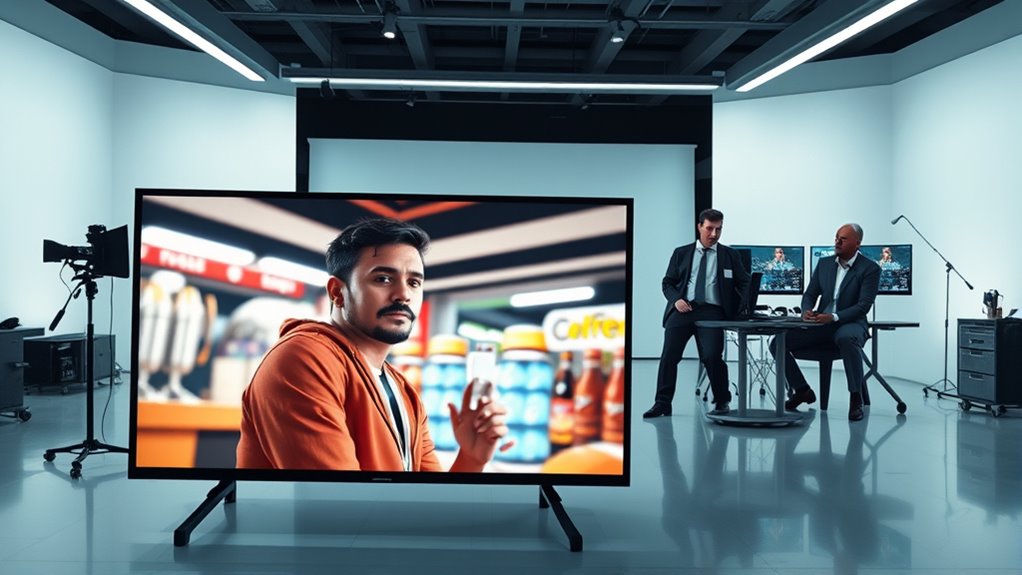Using deepfake technology for celebrity cameos in ads raises ethical concerns because it involves creating realistic images or videos without the celebrity’s permission. This can infringe on their rights, feel intrusive, and damage trust. Authenticity becomes blurred, leading viewers to believe celebrities genuinely endorse products, which can be deceptive. Responsible use, transparency, and consent are essential to avoid ethical pitfalls. If you keep exploring, you’ll discover how these issues impact trust and reputation in advertising.
Key Takeaways
- Using celebrity likenesses without consent infringes on personal rights and can be considered disrespectful and intrusive.
- Deepfake ads risk deceiving audiences by falsely implying celebrity endorsement, undermining authenticity.
- Lack of transparency about deepfake usage erodes trust between creators, brands, and viewers.
- Ethical guidelines are essential to ensure respectful, responsible use of digital likenesses in advertising.
- Prioritizing consent and authenticity helps protect individual rights and maintains media credibility.

Deepfake technology has revolutionized the way we create and experience digital media, making it possible to generate realistic celebrity cameos that never actually happened. While this innovation opens exciting creative possibilities, it also raises significant ethical questions, especially around consent issues and authenticity concerns. When you see a celebrity appearing in an advertisement through a deepfake, you might assume they willingly endorsed the product. However, unless the celebrity gave explicit permission, their likeness being used without consent can feel intrusive and disrespectful. This lack of consent not only infringes on personal rights but also erodes trust between creators, brands, and audiences. Celebrities invest considerable effort into managing their image, and when companies use deepfakes without their approval, it can lead to feelings of betrayal and exploitation.
Using celebrities in deepfakes without permission disrespects their rights and erodes audience trust.
Authenticity concerns are another major issue. Deepfake technology can produce highly convincing images or videos that blur the line between reality and fiction. As a viewer, you might be easily convinced that a celebrity genuinely participated in an ad campaign, which can mislead audiences about the authenticity of the message. This manipulation risks damaging the credibility of advertising and the trust you place in media content. When deepfake celebrity cameos are used deceptively, it becomes harder to separate genuine endorsements from fabricated ones, potentially influencing your purchasing decisions based on false representations. Additionally, the development of digital sound synthesis techniques can be used to enhance or alter audio in deepfake videos, raising further concerns about authenticity and deception.
Beyond individual consent and authenticity, there are broader implications for society. If you’re not aware that a celebrity’s appearance is a deepfake, you may unknowingly accept false endorsements or misinformation. This raises questions about accountability—who is responsible when deepfakes are used maliciously or unethically? Brands might prioritize sensationalism or marketing strategies over ethical considerations, risking their reputation and your trust. Conversely, creators and tech companies have a duty to establish transparent practices that respect rights and inform audiences when a deepfake is used.
Ultimately, the ethical use of deepfake celebrity cameos in ads requires careful balancing. You, as a viewer, deserve honesty and transparency, and creators must prioritize consent and authenticity to maintain integrity. Without clear boundaries and ethical guidelines, deepfake technology risks undermining the credibility of digital media and infringing on individual rights. As this technology evolves, so should your awareness and skepticism, prompting a more critical approach to the media you consume.
Frequently Asked Questions
Can Viewers Distinguish Between Real and Deepfake Celebrity Cameos?
You might find it challenging to distinguish between real and deepfake celebrity cameos, as visual deception can be highly convincing. Your awareness of potential manipulation can influence your skepticism, making you question the authenticity of what you see. Advances in technology often blur the line between reality and fiction, encouraging you to be more critical and cautious about trusting visual content, especially when it involves familiar faces.
How Do Deepfakes Impact Celebrity Endorsement Authenticity?
Imagine watching a commercial where a beloved celebrity’s smile feels just a little too perfect, almost too good to be true. Deepfake deception clouds your perception of celebrity authenticity, making it harder to trust endorsements. When you realize a celebrity’s image was artificially created, it diminishes the genuine connection, risking your trust. Deepfakes challenge how authentic celebrity endorsements appear, ultimately making you question what’s real and what’s fabricated.
Are There Legal Penalties for Unauthorized Deepfake Celebrity Appearances?
You should know that unauthorized deepfake celebrity appearances can lead to serious legal ramifications. Laws often address violations of intellectual property rights, especially when using a celebrity’s likeness without permission. If you create or distribute deepfakes without consent, you risk lawsuits, fines, or even criminal charges. It’s essential to respect intellectual property rights and obtain proper authorization to avoid legal penalties associated with unauthorized deepfake celebrity appearances.
What Are the Privacy Concerns Associated With Creating Deepfake Cameos?
Think of privacy concerns as walking a tightrope—you’re balancing innovation with respect. When creating deepfake cameos, you risk data misuse and breach of consent issues, which can harm celebrities’ reputations and personal lives. If you ignore these concerns, you could face legal trouble and damage trust. Always seek permission and handle data responsibly, because crossing these lines can lead to serious privacy violations that are hard to undo.
Could Deepfake Ads Influence Public Perception of Celebrities?
You might not realize it, but deepfake ads can considerably influence public perception of celebrities. They create fake fame, making it seem like a celebrity endorses products they never actually support. This can erode celebrity trust, as fans may feel deceived once they discover the manipulation. Ultimately, these deepfake ads shape opinions, often blurring the line between genuine endorsement and fabricated content, impacting how celebrities are viewed long-term.
Conclusion
As you consider the ethics of deepfake celebrity cameos, you realize it’s like walking through a crowded street where faces blend and fade. One moment, the star’s presence feels real, but behind the scenes, technology blurs truth and illusion. You sense the fine line between innovation and manipulation, knowing that just like a fleeting smile in a busy crowd, these digital appearances can both delight and deceive. Ultimately, it’s your choice to see through the illusion or get caught in it.









